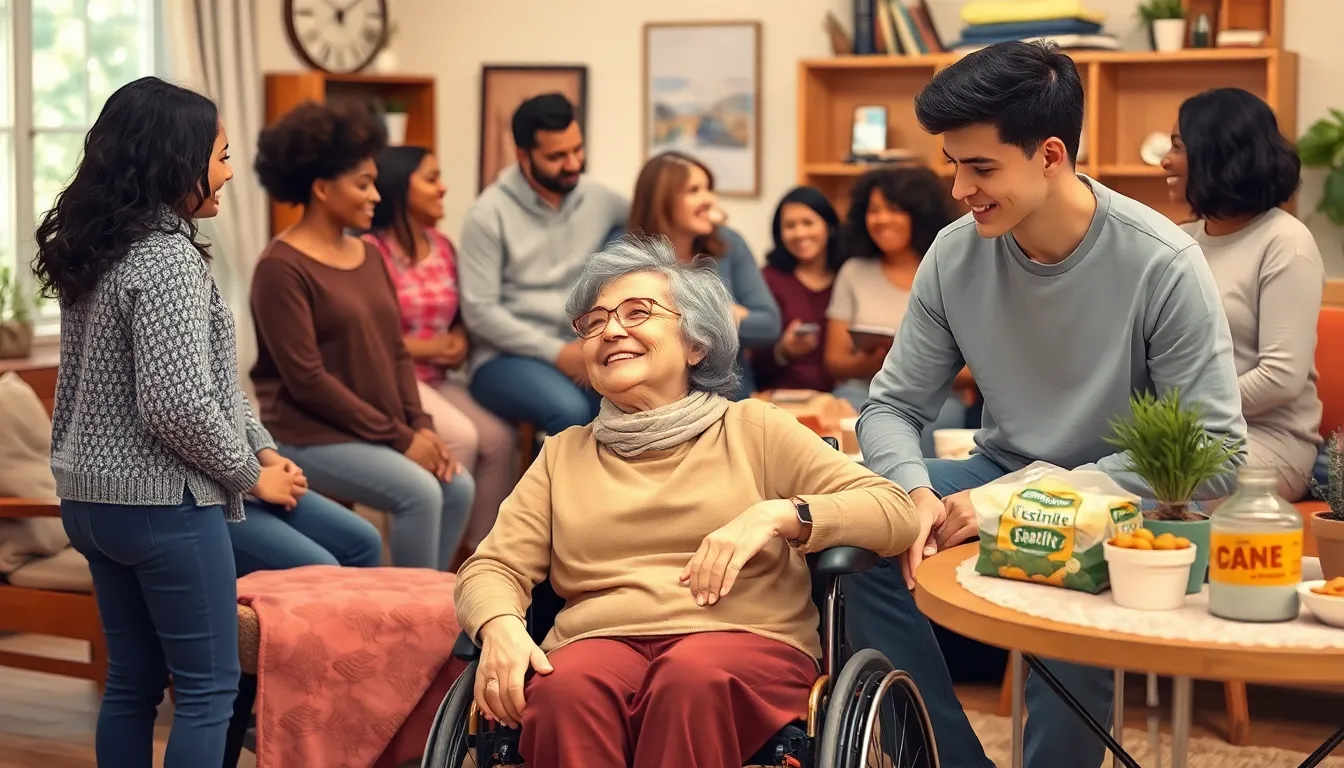Table of Contents
ToggleAs people age, maintaining cognitive function becomes increasingly important. Memory support for the elderly not only enhances their quality of life but also fosters independence and social engagement. With the rise of age-related memory challenges, families and caregivers are seeking effective strategies to help their loved ones navigate these changes.
From engaging brain exercises to nutritional support, various methods exist to bolster memory and cognitive health. Understanding the best practices can empower caregivers and families to create supportive environments that promote mental agility. This article explores practical approaches, resources, and tips for enhancing memory in the elderly, ensuring they remain connected and vibrant in their golden years.
Importance of Memory Support for Elderly
Memory support plays a crucial role in maintaining cognitive health in elderly individuals. Enhanced memory function contributes to improved quality of life, as it fosters independence and encourages active social participation. Support systems help mitigate the effects of age-related cognitive decline, allowing seniors to engage fully in their communities.
Age-related memory challenges prove increasingly common among seniors. According to research, nearly 40% of older adults experience noticeable memory issues. Effective <a href="https://unitedcaringshelters.com/geriatrics-fellowship”>memory support strategies empower caregivers and families to combat these challenges. Approaches such as brain exercises, memory games, and cognitive training promote mental agility and improve recall.
Nutrition significantly impacts cognitive function. Diets rich in antioxidants, omega-3 fatty acids, and vitamins can enhance memory. Incorporating foods like berries, fish, and leafy greens into daily meals supports brain health. Hydration also affects cognitive performance; seniors should drink adequate water to stay alert and focused.
Creating supportive environments is essential for boosting memory health. Familiar surroundings and routines provide comfort, reducing anxiety for seniors with memory difficulties. Engaging in social activities, hobbies, and meaningful interactions helps reinforce cognitive skills and strengthens memory connections.
Innovative technology solutions assist memory support as well. Devices like reminder apps and digital calendars offer practical help in remembering appointments and tasks. These tools minimize frustration, promoting confidence and independence among elderly individuals.
Through comprehensive support in memory health, families and caregivers can foster more fulfilling lives for seniors. A collective focus on memory enhancement allows each person to age with dignity, resilience, and vitality.
Common Memory Issues Among Elderly

Elderly individuals often face various memory issues that impact their daily lives and overall well-being. Understanding the types of memory loss and the factors contributing to memory decline can aid in developing effective support strategies.
Types of Memory Loss
- Short-term memory loss: Short-term memory allows individuals to remember information for a brief period, typically seconds to minutes. Difficulty recalling recent events or conversations often indicates this type of memory loss.
- Long-term memory loss: Long-term memory encompasses experiences and information stored over extended periods, often years. Seniors may struggle to recall past events or recognize familiar faces, affecting their sense of identity.
- Working memory loss: Working memory involves holding and processing information temporarily while performing cognitive tasks. Elderly individuals might find it challenging to follow conversations or multi-task, signaling working memory difficulties.
- Semantic memory loss: Semantic memory involves facts, concepts, and knowledge about the world. Older adults may experience challenges in retrieving specific facts or names, impacting their overall knowledge base.
- Episodic memory loss: Episodic memory pertains to personal experiences and specific events. Seniors may forget recent experiences, which can affect their ability to engage in conversations or share memories.
Causes of Memory Decline
- Age-related changes: Natural aging processes can reduce brain volume and neural connections, leading to general cognitive decline, including memory issues.
- Neurological conditions: Conditions like Alzheimer’s disease and other forms of dementia significantly impact memory function. These diseases lead to abnormal protein deposits in the brain, affecting cognitive capabilities as they progress.
- Mental health issues: Depression, anxiety, and stress can impair cognitive function and memory. These conditions may result in difficulty concentrating and recalling information.
- Chronic health conditions: Chronic illnesses like diabetes, hypertension, or heart disease can affect blood flow to the brain, contributing to memory decline.
- Medications: Certain medications may induce memory-related side effects. Antidepressants, antihistamines, and sleep aids can impair cognitive function in some individuals.
- Lifestyle factors: Poor diet, lack of physical activity, and inadequate sleep can detrimentally influence cognitive health. Nutrition plays a significant role in maintaining overall brain function.
Understanding these common memory issues helps caregivers and families address the specific needs of elderly individuals, allowing for the implementation of effective strategies to maintain cognitive health.
Effective Memory Support Strategies
Memory support for the elderly involves several effective strategies that promote cognitive well-being and independence. Implementing these approaches can enhance memory function and overall quality of life.
Cognitive Training Programs
Cognitive training programs offer targeted activities designed to strengthen memory and cognitive skills. These programs may include puzzles, memory games, and specific exercises aimed at enhancing focus and recall. Research indicates that engaging in cognitive training can result in improved memory performance, particularly for short-term and working memory. Many community centers and online platforms provide accessible training to seniors. Consistency in participation matters, with studies showing that regular engagement fosters better long-term results.
Nutrition and Diet
Nutrition plays a crucial role in brain health. Diets rich in antioxidants, omega-3 fatty acids, and vitamins support cognitive function. Foods such as blueberries, fatty fish, leafy greens, and nuts contribute essential nutrients that benefit memory. Hydration is equally important, as even mild dehydration can impair cognitive abilities. Seniors should aim to drink adequate water daily and balance their meals to include a variety of food groups. Consultation with a healthcare professional can ensure that dietary needs are adequately met.
Physical Activity
Physical activity significantly benefits cognitive function and memory retention. Regular exercises, such as walking, swimming, or yoga, boost blood flow to the brain and enhance neural connections. Studies demonstrate that seniors who engage in physical activity experience slower cognitive decline. Aim for at least 150 minutes of moderate aerobic activity weekly, coupled with strength training exercises twice a week. Encouraging participation in group activities can also foster social connections, which further supports cognitive health.
Role of Technology in Memory Support
Technology plays an essential role in enhancing memory support for the elderly, offering innovative tools to help maintain cognitive health. From memory aids to virtual experiences, these solutions promote engagement and independence among seniors.
Memory Aids and Apps
Memory aids and apps serve as effective tools for seniors experiencing memory challenges. Reminder applications enable users to set alerts for medications, appointments, and daily tasks, enhancing organization. Digital calendars provide visual reminders, making it easier for elderly individuals to keep track of important dates. Furthermore, dedicated memory training apps offer interactive exercises designed to strengthen recall skills, often incorporating games and puzzles to make learning enjoyable. Daily engagement with these tools promotes routine and increases cognitive confidence, supporting overall memory function.
Virtual Reality and Cognitive Therapy
Virtual reality (VR) technology presents a novel approach to cognitive therapy for the elderly. VR environments can simulate real-life situations, enabling seniors to practice memory recall in a safe space. These immersive experiences stimulate cognitive processes, enhancing brain activity and engagement. Research indicates that VR can aid in rehabilitating memory skills in individuals with memory impairments, particularly those affected by neurodegenerative diseases. Offering a dynamic and interactive alternative to traditional therapy, VR supports cognitive development while fostering an enjoyable experience for seniors, striking a balance between fun and functional memory exercises.
Memory support for the elderly is essential in promoting a fulfilling and independent life. By implementing effective strategies such as cognitive training, nutritious diets, and engaging social activities, caregivers can significantly enhance cognitive function. Utilizing technology, like reminder apps and virtual reality, can also provide valuable assistance in daily routines.
Creating a supportive environment that fosters mental agility and emotional well-being is key. As families and caregivers prioritize these approaches, they empower seniors to maintain their cognitive health. Ultimately, a commitment to memory support not only enriches the lives of elderly individuals but also strengthens their connections with loved ones, enabling them to thrive in their golden years.



